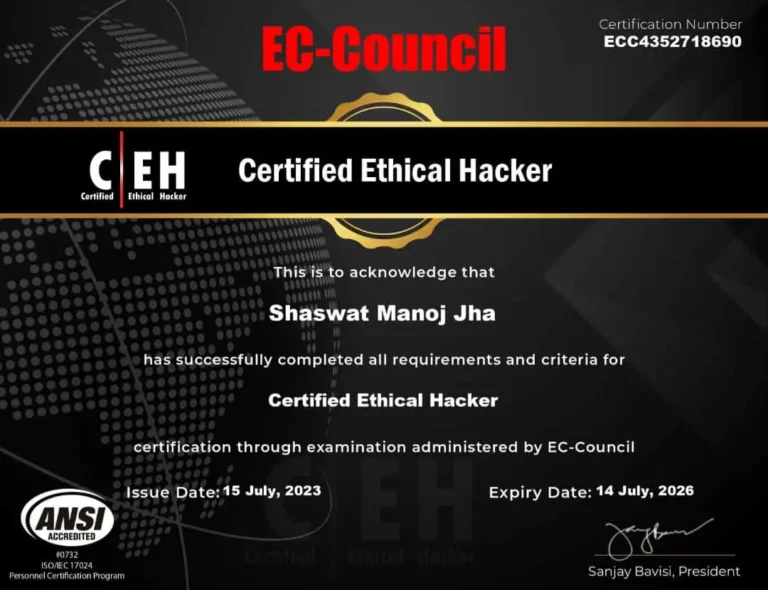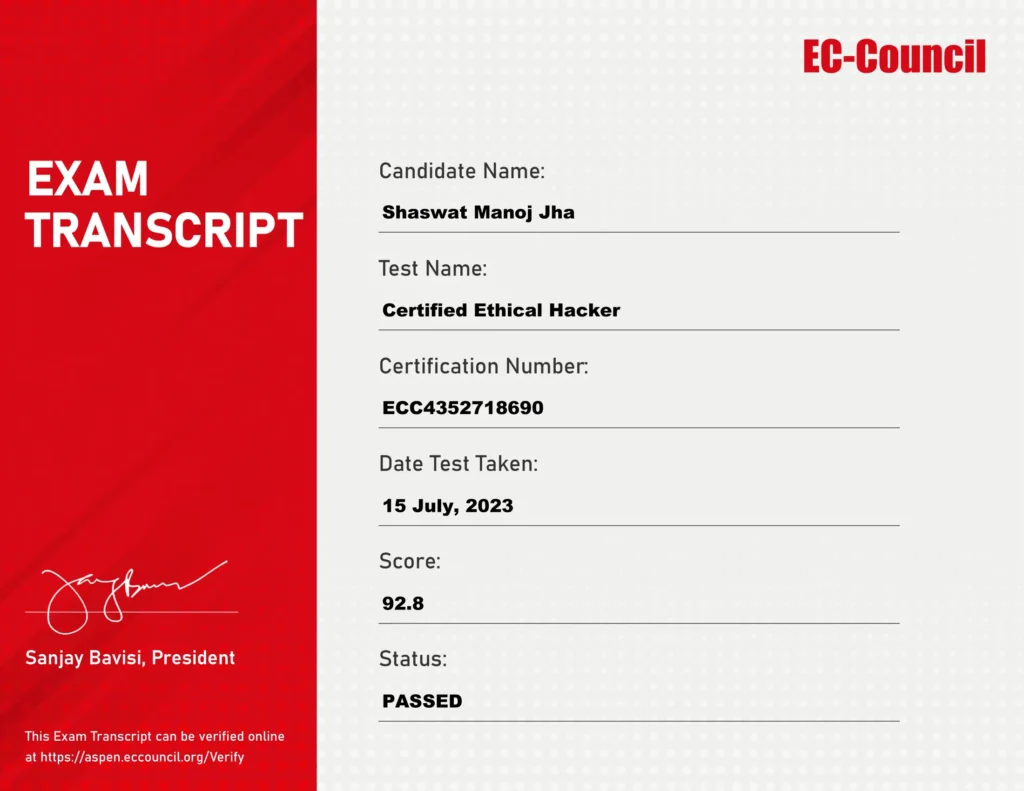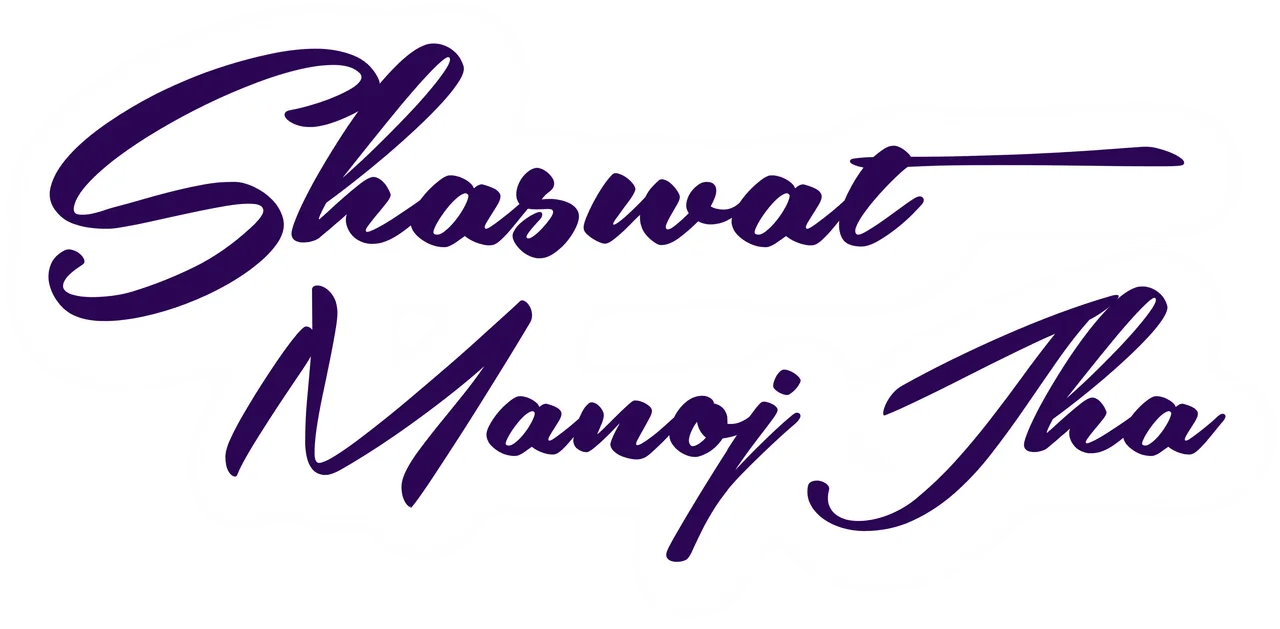Certified Ethical Hacker (CEH)
A Certified Ethical Hacker possesses expert knowledge and proficiency in identifying and analyzing weaknesses and vulnerabilities within target systems. I earned the certification with 92.8% score.
They utilize the same tools and techniques as malicious hackers but with a lawful and ethical approach, aiming to evaluate the security status of the targeted system(s). This certification acknowledges individuals as skilled professionals in the field of Ethical Hacking from a vendor-neutral standpoint, focusing on network security discipline.
Category
Cybersecurity
Issued By
EC – Council
Issue Date
July 15th, 2023
Expiry Date
July 14th, 2026
Certification ID
ECC4352718690
Verification Links

What is a Certified Ethical Hacker (CEH)?
A Certified Ethical Hacker (CEH) is a cybersecurity professional trained to identify vulnerabilities and security weaknesses in computer systems, networks, and applications – using the same tools and techniques as malicious hackers, but in a lawful and controlled manner.
The objective of an ethical hacker is to think like an attacker to help organizations strengthen their defenses before real-world threats can exploit them.
CEHs apply structured methodologies across areas such as reconnaissance, system hacking, web application testing, and network exploitation, while adhering to strict ethical guidelines defined by EC-Council.
This certification establishes a professional’s capability to assess, analyze, and secure digital environments, ensuring the confidentiality, integrity, and availability of organizational data and infrastructure.
Exam Domains
The CEH curriculum is organized into nine technical domains, providing a complete understanding of ethical hacking and security testing techniques:
- Cryptography
- Web Application Hacking
- Mobile Platform and IoT Hacking
- System Hacking Phases and Attack Techniques
- Network and Perimeter Hacking
- Wireless Network Hacking
- Information Security and Ethical Hacking Foundations
- Reconnaissance Techniques
- Cloud Computing
Key Learning Outcomes
Gained practical knowledge of vulnerability assessment, penetration testing, and attack simulation.
Mastered the use of industry tools such as Burp Suite, Metasploit, and Nmap for identifying and analyzing threats.
Strengthened understanding of network security, web application defense, and ethical hacking governance.
Learned to apply ethical hacking principles in real-world corporate environments within compliance and risk frameworks.
Benefits of CEH Certification
The CEH exam is designed to test a candidate’s ability to think like a hacker while adhering to ethical standards. A solid understanding of the exam pattern and preparation strategies can greatly enhance your chances of success.
CEH certification is highly regarded in the cybersecurity industry and offers numerous benefits to aspiring professionals:
Industry Recognition:
Being certified as an Ethical Hacker enhances your credibility and demonstrates your expertise in the field of cybersecurity.Diverse Career Opportunities:
CEHs are in demand across various industries, including IT, finance, healthcare, and government sectors.Stay Ahead of Cyber Threats:
With continuous updates on the latest hacking techniques, CEHs can stay one step ahead of cybercriminals.Ethical Hacking Skills:
The certification equips you with practical knowledge and hands-on experience in ethical hacking methodologies.Network Security Expertise:
CEHs gain a comprehensive understanding of network security from a vendor-neutral perspective.
How to Obtain CEH Certification
To becoming a Certified Ethical Hacker you need to follow these steps:
Preparation:
Understand the CEH exam blueprint and review study materials from official EC-Council resources.Training:
Attend an accredited CEH training program covering ethical hacking fundamentals, tools, and best practices. (Skip if self studying)Hands-on Practice:
Practice is essential for mastering ethical hacking tools and techniques. Set up a virtual lab to experiment in a safe environment.Exam Registration:
Once you feel confident in your skills, register for the CEH exam through the EC-Council’s official website.Passing the Exam:
The CEH exam consists of 125 multiple-choice questions and you get 4 hours to answer them. Passing the exam requires a solid grasp of the subject matter.Obtaining Certification:
Upon successfully passing the exam, you will be awarded the prestigious CEH certification, demonstrating your ethical hacking prowess to employers.
Transcript

Conclusion
The Certified Ethical Hacker (CEH) certification deepened my technical foundation and enhanced my analytical mindset as an information security professional.
It has strengthened my capacity to identify and mitigate vulnerabilities effectively – enabling me to safeguard organizational assets with an ethical, proactive, and structured cybersecurity approach.
